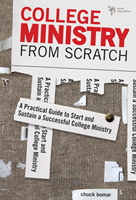 “Remember, college-age people don’t necessarily need another study as much as they need to watch and follow the example of others.” (p.115)
“Remember, college-age people don’t necessarily need another study as much as they need to watch and follow the example of others.” (p.115)
College Ministry from Scratch, by Chuck Bomar (Zondervan 2010)
Chuck Bomar draws extensively on his experience working with college-age young adults in a congregational setting. In his philosophy, Bomar sees a congregational context for college ministry as ideal. In the model he promotes, college-age adults need to have opportunities to form relationships with other Christians who are further down the road in life experience. These relationships can help individuals to sort through the issues they are struggling with and provide a role model who is beyond the transitional life stage of young adulthood. At the same time, Bomar’s book readily acknowledges and promotes the need college age adults have to connect with peers.
I was impressed and encouraged by the accessibility of the author’s ideas and suggested starting points. His strong emphasis on creating opportunities for mentoring relationships to form keeps specific program ideas at arm’s length. His writing assumes that programmed events will happen (as time and resources allow), but his recurring emphasis is on seeking out conversations with college-age people to get to know them as individuals.
Three big positives stuck out in my mind as I finished reading College Ministry from Scratch. First, the author knows well the issues college-age people are dealing with. His experience comes through when he succinctly outlines issues of identity, intimacy, meaning, pleasure and truth. Second, the simplicity of his suggestions is highly encouraging. There are plenty of ideas in this book which are accessible whether you are a paid church staff person adding college ministry to your already full job description or a lay volunteer who just wants to see something happen for the students in your congregation. Finally, Bomar does a great job of offering lots of simple ideas for getting to know students, connecting people and connecting to a campus without pretending to offer one magical solution to the challenge of college ministry.
Unfortunately, I would caution any reader to pay attention to Bomar’s theology. This came across most pointedly in his chapter on suggested questions to ask in one-on-one conversations. For the most part, his questions and suggestions on what to listen for are great. In one case he suggests guiding people to look at the fruits of their faith as proof of their salvation (he suggests this as a source of confidence). My suggestion is that you don’t let this one page keep you from making use of the book. Instead, ask another youth leader, DCE or Pastor if they would take the time to read through this chapter (or the whole book) with you and discuss any questions it raises.






0 Comments